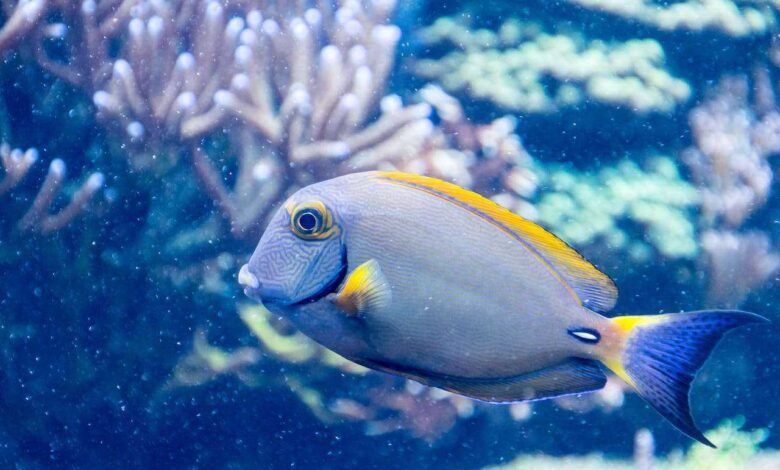
Maintaining the well-being and happiness of your pet fish requires an understanding of their unique needs and a commitment to providing a conducive and nurturing environment. By incorporating effective care, maintenance, and engagement strategies, you can ensure that your aquatic companions thrive and flourish in their underwater habitat. This comprehensive guide offers valuable insights and practical tips on how to keep your pet fish healthy and happy, creating a harmonious and enriching experience for both you and your aquatic companions.
Understanding the Fundamentals of How to Keep your Pet Fish Healthy:
Creating an optimal aquarium environment begins with a comprehensive understanding of the fundamental elements that contribute to the well-being of your pet fish. Let’s delve into the key aspects of pet fish care:
Proper Tank Setup and Maintenance
- Understanding the importance of tank size and appropriate water volume for different fish species
- Implementing effective filtration systems and regular water changes to maintain water quality and clarity
- Selecting suitable substrate and decorations that mimic natural aquatic environments and provide hiding places for fish
Water Quality Management
- Monitoring and regulating water temperature, pH levels, and ammonia and nitrate concentrations
- Conducting regular water tests using reliable testing kits to ensure optimal water parameters for your fish
- Addressing any water quality issues promptly to prevent stress and potential health problems in fish
Suitable Lighting and Environmental Conditions
- Providing adequate lighting that mimics natural daylight and promotes the growth of live plants
- Creating a stable and comfortable environment with consistent water temperature and minimal fluctuations
- Reducing external stressors such as loud noises and sudden movements that can disrupt the aquarium ecosystem
Maintenance Routines and Cleaning Procedures
- Establishing a regular cleaning schedule for aquarium maintenance tasks, including water changes and filter maintenance
- Ensuring thorough removal of algae and debris to maintain a clean and visually appealing tank environment
- Implementing effective cleaning techniques that minimize disturbances to fish and their natural habitat
Nutrition and Feeding Practices
- Understanding the dietary requirements of different fish species and providing a balanced and nutritious diet
- Offering a variety of high-quality fish food, including flakes, pellets, and live or frozen treats to meet specific nutritional needs
- Maintaining a consistent feeding schedule that prevents overfeeding and promotes healthy digestion in fish
Preventing and Managing Common Pet Fish Diseases:
Preventing and managing common pet fish diseases is essential for maintaining a healthy and disease-free aquarium environment. Let’s explore the key strategies for disease prevention and management:
Identifying Common Fish Diseases and Symptoms
- Familiarizing yourself with the signs and symptoms of common fish diseases, including fungal infections, bacterial diseases, and parasitic infestations
- Observing changes in fish behavior, appetite, and physical appearance as potential indicators of underlying health issues
- Consulting reputable aquatic resources and professional veterinarians for accurate diagnosis and effective treatment options
Implementing Quarantine Procedures for New Fish
- Establishing a quarantine tank for new fish additions to prevent the spread of potential diseases to the existing fish population
- Conducting thorough observations and health assessments during the quarantine period to ensure the overall well-being and compatibility of new fish
- Introducing new fish to the main aquarium only after completing the necessary quarantine period and confirming their optimal health status
Administering Effective Treatment Protocols
- Selecting appropriate treatment methods, including medicated food, water additives, and topical treatments, based on the specific fish disease and its severity
- Following recommended dosage instructions and treatment durations to ensure the safe and effective elimination of pathogens and parasites
- Monitoring fish closely during and after the treatment process to evaluate their response and recovery from the targeted fish disease
Cultivating a Positive and Enriching Environment for Your Pet Fish:
Creating a positive and enriching environment for your pet fish involves fostering mental stimulation and social interaction that contribute to their overall happiness and well-being. Let’s explore the essential strategies for cultivating a vibrant and engaging fish habitat:
Selecting Compatible Tank Mates and Community Fish
- Researching the social behaviors and compatibility of different fish species to establish a harmonious and peaceful fish community
- Choosing suitable tank mates that exhibit compatible behaviors and coexist well within the same aquatic environment
- Monitoring fish interactions and addressing any signs of aggression or territorial disputes to maintain a balanced and cohesive community of fish
Incorporating Natural and Stimulating Aquarium Decorations
- Introducing live plants, driftwood, and rocks that mimic natural aquatic habitats and provide shelter and exploration opportunities for fish
- Creating diverse and engaging landscapes within the aquarium that encourage natural behaviors and promote mental stimulation in fish
- Arranging decorations strategically to establish designated territories and create visually appealing focal points within the tank
Implementing Interactive Feeding and Enrichment Activities
- Incorporating interactive feeding techniques such as food puzzles, slow-release feeders, and grazing stations to encourage natural foraging behaviors in fish
- Offering varied and engaging feeding experiences that stimulate fish senses and promote physical activity and mental engagement
- Rotating feeding strategies and enrichment activities to prevent monotony and boredom in fish and encourage active participation in their feeding routines
Providing Adequate Rest and Retreat Spaces
- Designing the aquarium layout to include ample resting areas and secluded retreat spaces where fish can seek privacy and relaxation
- Creating shaded and dimly lit zones that offer a sense of security and comfort for fish, especially during periods of heightened activity and stress
- Ensuring the availability of multiple hiding spots and secure shelters that cater to the individual needs and preferences of different fish species
Building a Strong Bond with Your Pet Fish:
Developing a strong and enduring bond with your pet fish involves establishing trust-building and interaction techniques that foster a deep and meaningful connection. Let’s explore the key strategies for building a strong bond with your aquatic companions:
Establishing a Calm and Non-Threatening Presence
- Approaching the aquarium with a gentle and calm demeanor that instills a sense of security and reassurance in fish
- Avoiding sudden movements, loud noises, and disruptive activities that may cause stress or anxiety in fish
- Cultivating a peaceful and tranquil environment that promotes relaxation and emotional well-being for both you and your fish
Encouraging Gentle and Interactive Observations
- Devoting regular time for observing fish behavior, social dynamics, and individual personalities within the aquarium
- Initiating gentle interactions and responsive behaviors that encourage fish to approach and engage with you during feeding and maintenance routines
- Respecting the natural boundaries and personal space of fish while fostering a sense of curiosity and trust through positive and non-intrusive interactions
Implementing Positive Reinforcement and Reward-Based Training
- Introducing positive reinforcement techniques such as clicker training and target feeding to encourage desired behaviors and interactive responses in fish
- Offering rewards and treats in the form of live or frozen food, acknowledging fish accomplishments and successful training attempts
- Establishing a consistent and encouraging training routine that promotes mental stimulation and reinforces the bond between you and your pet fish
Establishing a Consistent and Trusting Relationship
- Building a consistent and trusting relationship with your fish through regular interactions, observations, and mutual understanding
- Recognizing the individual preferences and behaviors of each fish and adapting your interaction style to accommodate their unique personalities and temperaments
- Nurturing a sense of companionship and mutual respect that transcends the physical boundaries of the aquarium and fosters a deep and enduring connection between you and your aquatic companions
How to Keep your Pet Fish Healthy
Nurturing the well-being and happiness of your pet fish is a fulfilling and enriching journey that requires dedication, compassion, and a genuine appreciation for the intricate beauty and wonder of aquatic life. By understanding the fundamental aspects of pet fish care, implementing effective disease prevention and management protocols, cultivating a vibrant and engaging aquarium environment, and fostering a strong and enduring bond with your fish, you can create a harmonious and nurturing space that promotes longevity, vitality, and contentment for your beloved aquatic companions. With these invaluable insights and practical tips, you are well-equipped to embark on a fulfilling and meaningful fishkeeping experience that celebrates the joy and tranquility of the underwater world and fosters a profound connection between you and your cherished pet fish.








